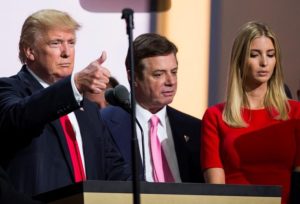 Yes, it’s more than what it seems.
Yes, it’s more than what it seems.
On their face, the current criminal proceedings against Paul Manafort, Trump’s erstwhile campaign manager, involve bank fraud, tax evasion, and money laundering.
But, like a swimming beach undertow, there’s something deeper and much more sinister lurking below the surface in that Virginia federal courtroom.
(Manafort is scheduled for a second trial in a D.C. federal court beginning in September 2018.)
From The Atlantic (read story here):
In 2014, “Manafort’s ‘cash spigot’ and ‘golden goose’—the pro-Russian president of Ukraine, Viktor Yanukovych, whom Manafort advised for more than a decade—was ousted and fled to Russia. Manafort’s funds dried up, and that’s when he began committing bank fraud to secure loans, according to prosecutors. …
“In March 2016, as his firm, Davis Manafort Partners, was losing hundreds of thousands of dollars a month—it reported a $1.2 million loss in 2016—and while he was reportedly in debt to pro-Russian interests by as much as $17 million, Manafort took on a pro bono role with the Trump campaign.
“A month later, he appeared to offer the Kremlin-linked Russian oligarch Oleg Deripaska access to the campaign in exchange for debt relief, and in May, he was told by the campaign’s foreign-policy adviser, George Papadopoulos, that ‘Russia has been eager to meet Mr. Trump for quite some time and have been reaching out to me to discuss.’
“In June, Manafort attended a meeting at Trump Tower with Russian nationals offering dirt on Clinton. In August, Manafort was forced to formally step down as campaign chairman after reports surfaced that he was allocated millions in off-the-books payments by Ukraine’s pro-Russian Party of Regions. And throughout the campaign, Manafort remained in touch with with his longtime associate Konstantin Kilimnik—a Russian Ukrainian operative with ongoing ties to Russian intelligence services, according to Special Counsel Robert Mueller. …
“Trump and his allies have sought to downplay the trial, claiming that it has nothing to do with either the president or a conspiracy with Russia to win the election. But Manafort didn’t suddenly change his lifetime m.o.—trading and leveraging influence for cash—when he joined the campaign. The Deripaska episode I described above, in which Manafort dangled access to the campaign in an attempt to ‘get whole’ with the Russian oligarch, is just one example …. Manafort also offered a banking executive at Chicago’s Federal Savings Bank a position on the Trump campaign in exchange for help in obtaining approximately $16 million in loans ….”
So what are we to make of this? Simply this: Manafort is/was an influence peddler, pure and simple. What he sold to the Russians was access to Trump. That access was real; he had it, and the Russians paid him tens of millions of dollars for it. But it would be worthless, and wasted money, unless Trump became president.
This trial won’t answer the question of whether Trump was legitimately elected by the American people (under our Electoral voting system), or selected against the will of the American people by his Russian sponsors.
But that’s the next and obvious question to ask.
Photo: Trump and Manafort, best buddies
(Cross-posted from Horsesass.org)